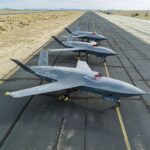
The U.S. Air Force may narrow the field of five contractor teams for the first Collaborative Combat Aircraft (CCA) technology effort to two to three in the next several months. The Air Force has contracted with teams–led by Anduril, Boeing [BA], General Atomics, Lockheed Martin [LMT], and Northrop Grumman [NOC]–for concept definition and preliminary design of CCA Increment 1 (Defense Daily, Jan. 24). "We're moving with a sense of urgency on CCA," Secretary of the Air Force Frank Kendall told reporters at the Air and Space…











